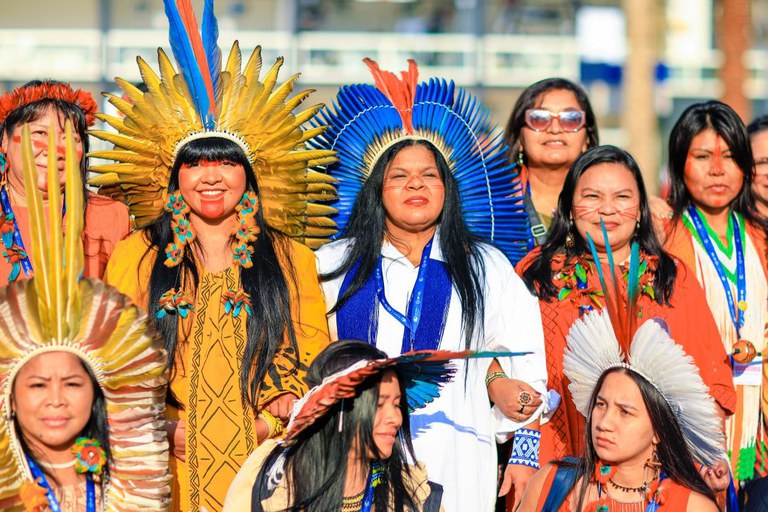Notícias
COP 28
Indigenous peoples leave COP 28 energized and optimistic, says Sônia Guajajara

Minister Sônia Guajajara praised the reception given to indigenous peoples at COP 28 - Photo: Estevam Rafael / Audiovisual / PR
The statement by Sônia Guajajara, Minister of Indigenous Peoples, leaves no doubt as to the importance of indigenous peoples and traditional communities in protecting forests and, consequently, fighting climate change: "We are only 5% of the world's population, but 82% of the biodiversity protected in the world is within indigenous territories".
After an effective participation in the United Nations Climate Change Conference – COP 28, held in Dubai, when she had the opportunity to lead the Brazilian delegation in the absence of the Minister of the Environment, Marina Silva, Sônia Guajajara returns to Brazil with the belief that the UN event in the United Arab Emirates marked a new paradigm with regard to the participation of indigenous peoples in Climate Conferences.
COP 28 was marked by the largest presence of indigenous peoples in the entire history of the COPs and, more than just attending in large numbers, the representatives of indigenous peoples and traditional communities were heard and sat at the debate tables to discuss their role in the actions that need to be taken so that the world can actually put into practice effective actions to combat the climate crisis.
Giving an overview of COP 28, Sônia Guajajara praised the welcome given to indigenous peoples, highlighted the participation of everyone at the discussion tables and revealed that she felt the international community had high expectations for COP 30, which will be held in Belém (PA) in 2025.
• COP 28 and indigenous peoples
"At this COP, we already have the largest indigenous delegation in Brazil and also the largest indigenous delegation in the world in the entire history of the COP. In addition to our physical presence, we also played a leading role. It was the first time that we had indigenous people participating directly in a dialogue with the negotiators from Brazil. We were also able to create and announce an international commission made up of all the bodies that already exist in the indigenous debate at the COP, such as the Platform of Indigenous Peoples and Local Communities, within the UNFCC; the Indigenous Caucus, which is the global space for indigenous participation; the UN Permanent Forum, and various macro-regional organizations, such as the Global Alliance. So, we are also creating this structured space to train indigenous negotiators. This is also a significant benefit for us".
• The role of indigenous peoples in combating climate change
"Indigenous peoples are increasingly taking the lead in discussions. Indigenous peoples' knowledge has already been recognized as scientific knowledge under the Paris Agreement. Indigenous peoples and traditional communities are critical allies in the fight against climate change. Indeed, indigenous territories have proven to be one of the most effective climate change mitigation strategies. According to UN data, indigenous peoples make up only 5% of the world's population, but they control more than 82% of the world's protected biodiversity. So, this alone demonstrates the importance of preserving ways of life and cultures, and that we must establish a link between environmental protection, climate finance, and indigenous peoples' rights protection. Because we are the most powerful guardians, we must be recognized as decision-makers. And we are making progress in this regard. We are now able to speak directly with countries and negotiators in order to include indigenous peoples in the central issues that are decided here".
• The work of the Ministry of Indigenous Peoples in 2023
"Despite being a new ministry, we have already had several significant actions this year to move forward with the demarcation of indigenous territories. In Brazil, 11 territories were demarcated in ten years, and eight indigenous territories were demarcated this year, in 2023, in just eight months. We are carrying out de-intrusion actions in the Yanomami and Apyterewa territories, as we have already done in the Upper Guamá River, as well as resuming social participation spaces, such as the National Council for Indigenous Policy, and relaunching PNEGAT, which is the National Policy for Environmental and Territorial Management of Indigenous Lands, with the installation of the Management Committee and coordination with other ministries. We will continue to strengthen the ministry in order for it to be recognized as a critical component in the fight against climate change".
• International expectations for COP 30 in Brazil
"There is widespread anxiety. This is a critical COP. President Lula has frequently stated that now is the time for the Amazon to speak to the rest of the world. So, we believe that this COP will be decisive in finding sufficient and appropriate alternatives to reduce emissions. And this reduction in emissions will only be possible by combating deforestation, achieving the 30x30 Agenda goal of zero deforestation by 2030, as Brazil has stated, and taking all of these environmental protection and monitoring measures. And we are collaborating with the government, specifically with President Lula, to achieve these objectives".